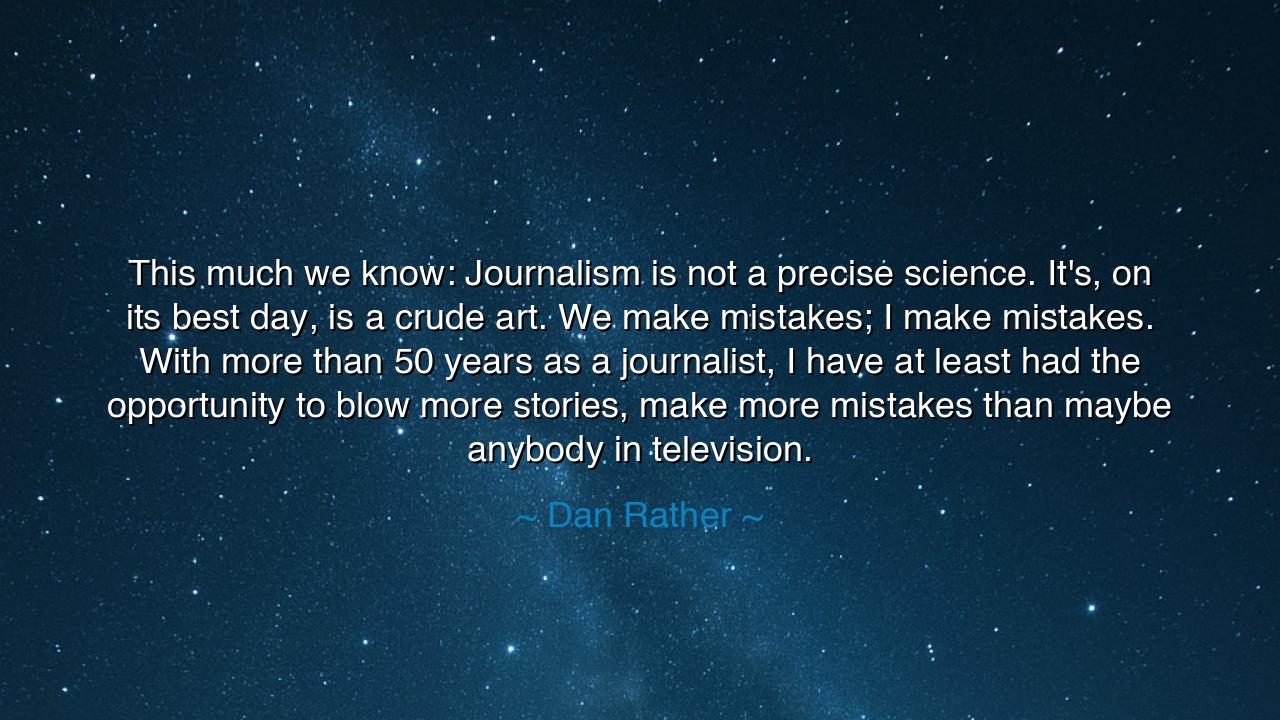
This much we know: Journalism is not a precise science. It's, on
This much we know: Journalism is not a precise science. It's, on its best day, is a crude art. We make mistakes; I make mistakes. With more than 50 years as a journalist, I have at least had the opportunity to blow more stories, make more mistakes than maybe anybody in television.






Hear now, O children of truth, for I bring forth the words of Dan Rather, a man whose life has been shaped by the pursuit of knowledge, but tempered by the reality that journalism, like life itself, is fraught with imperfection. “This much we know: Journalism is not a precise science. It's, on its best day, a crude art. We make mistakes; I make mistakes. With more than 50 years as a journalist, I have at least had the opportunity to blow more stories, make more mistakes than maybe anybody in television.” These words, though humble, speak to a profound truth—a truth that resonates in the hearts of all who seek to uncover the realities of the world, and yet must contend with the limitations of their craft.
In the days of the ancient Greeks, the great philosophers sought to understand the nature of truth and knowledge, and they understood that the pursuit of truth was not a straight path, but one filled with obstacles, errors, and missteps. Socrates himself, the greatest of them all, acknowledged his own ignorance, famously declaring that “I know that I am intelligent, because I know that I know nothing.” This humility in the face of knowledge—this recognition that truth is not something that can be fully captured or perfectly conveyed—is the very essence of what Rather speaks to. Journalism, like philosophy, is a pursuit of truth, but it is one that, by its very nature, cannot always be precise or perfect.
Rather reminds us that journalism is, at its core, a form of art, a crude art at best, where the quest for accuracy must always contend with the limitations of human perception, bias, and error. Just as a painter may sometimes fail to capture the full essence of a subject, or a sculptor may misjudge the proportions of their marble, so too does the journalist sometimes fail to fully convey the truth. The journalist’s tools are not brushes or chisels, but words and images, and these tools, though powerful, are not infallible. Rather, in his years of service, has seen the mistakes, the failures, and the misunderstandings that come with the territory of trying to capture a fleeting truth in a world that is ever-changing and complex.
Consider the tale of Herodotus, the ancient historian often called the "father of history." While he is lauded for his attempts to document the events of the world around him, his work was far from perfect. Herodotus often relied on hearsay and unverified accounts, and many of his stories were later proven to be more myth than fact. Yet, his writings were foundational, for they sought to give an account of the human experience, even if that account was not always precise. In the same way, Rather’s words remind us that the truth in journalism is often shaped not just by facts, but by the limitations of human experience. The journalist is not a machine of perfect precision, but a human being trying to navigate a world of uncertainty, bias, and shifting perspectives.
In this, we see a lesson in humility and perseverance. Rather, with his many years of experience, admits to his own mistakes, not as a failure, but as a reflection of the ongoing struggle for truth. The journalist, like the philosopher, must be willing to acknowledge their limitations, to accept that they will make mistakes, and to use those mistakes as opportunities for growth. It is not in perfection that the journalist finds their strength, but in their ability to learn, to adapt, and to continue seeking the truth, despite the obstacles in their way. This lesson is one that transcends journalism and applies to all forms of knowledge and inquiry.
In your own lives, O children of the earth, remember that no pursuit is free from error, no journey is without its missteps. Whether you seek truth in the realm of science, art, history, or politics, know that your path will be filled with mistakes. Do not be disheartened by them, for they are a part of the journey. What matters is not whether you fail, but how you rise from your failures. Just as Rather has spent decades in the pursuit of truth, learning from every misstep, so too must you be willing to learn from your own mistakes and use them to fuel your progress.
The great lesson here is one of courage and integrity. To acknowledge your mistakes is not a sign of weakness, but of strength. It is in the act of acknowledgment that you grow, and it is through the ongoing pursuit of truth—despite the inevitable mistakes—that you will find wisdom. As you move forward, remember that your own path, like the path of Dan Rather, will be shaped by your willingness to confront your failures, to embrace your imperfections, and to continue onward with a heart full of humility and a mind focused on the truth. The world is full of mystery, and the pursuit of understanding is fraught with challenges, but it is through these challenges that we come to know ourselves and the world around us.






AAdministratorAdministrator
Welcome, honored guests. Please leave a comment, we will respond soon